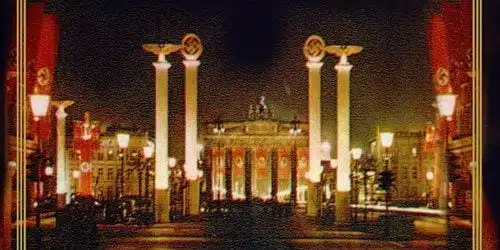
“Mankind is in grave danger, but democratic governments seem not to know what to do. If they do nothing, Western civilization, religious, personal and economic freedom are in grave danger.”
Those could easily be the words of a political commentator discussing the post-9/11 political climate, the threat of fundamentalist terrorism or the unknown dangers of cyber-attacks. That they are not is intriguing, implying that grave danger has always been a possibility; that religious, personal and economic freedom have remained the building blocks of Western civilisation for some time; that decisions as to whether or not to intervene when mankind is in grave danger have defined modern history. It’s tempting to view Erik Larson’s In the Garden of Beasts as a cautionary tale for the divided, reactionary world in which we live today. To do so would be a disservice.
In fact, those were the words of William E. Dodd, a modest, conservative professor of history thrust into the bowels of cruelty as US ambassador to Germany in 1933. He is universally acknowledged as the wrong man for the job. Buoyed by a romanticised stint earning a doctorate in Leipzig, Dodd initially refuses to acknowledge the barbarism of the Nazi regime. Repulsed by what he gradually learns, he is then marginalised for doing so.
Accompanying Dodd in Berlin is his wife, their son and their gregarious daughter Martha. Recently divorced and immediately drawn to the boisterous ambassadorial life, Martha is a trophy to members of Hitler’s inner circle, the head of the Gestapo and an agent of the NKVD (the precursor to the KGB).
Larson’s most difficult task here is to navigate the preconceptions of his audience. The first senior Nazi Martha meets, at one of many late night sojourns, is Putzi Hanfstaengl, the foreign press chief. His entrance is almost comical. He waltzes into the charade passing out business cards adorned with nothing but a phone number and the address of his hotel. Martha is intrigued by this vacuous display of chauvinistic positivity and the exuberance of the young Nazi elite.
In the wrong hands, Martha would be a fawning damsel; Hanfstaengl a smarmy monster. But Larson is a far better writer than that. Drawing on a huge range of diaries, letters, memoirs and official documents, he dismisses stereotypes in favour of rounded, human characters, no matter their political persuasion. Martha’s promiscuity reveals much of the narcissism of early Nazi rule, but she is also entrusted with more sensitive information, despite — or, perhaps, because of — her relation to a neutral party.
Dodd, in contrast to his daughter, despises the extra-curricular activities of the foreign service. His main professional concern is to minimise the cost of the embassy’s operations. He is happy to downplay beatings of American tourists at the hands of the Schutzstaffel provided his staff only use as many envelopes as they need. Stubborn and set in his ways, Dodd is at odds with the vitality of his contemporaries.
Initially, Larson uses Dodd as a transition in to accounts of the historical events such as the creation of concentration camps in Dachau and elsewhere, and the squabbles of Adolf Hitler and Philip Röhm that led to The Night of the Long Knives. But as his nostalgia for the Germany he knew from his college studies in Leipzig fades, Dodd is shown as a man of principle, using public forums to speak out against the Nazi regime despite the distance of his peers in the state department and his president.
All of which begs the question Larson cites as his motivation for the book: Why was nothing done by the US to prevent the rise of the Nazi party in 1933? An unpopular ambassador? Maybe, but Dodd’s British and French colleagues also expressed concern. An assumption that the regime was too irrational to last? Desperation for peace after so much violence? Larson does not answer these questions. He can not. But his evocative account of Dodd and Martha’s experiences offers a tantalising glimpse into the inner workings of the Nazi party and the mindset and circumstances which led to Dodd’s isolation and America’s lack of interest in the Nazi regime.
Larson’s book is not polemical. The nuances of personal and political thought are products of the strange milieu of 1933 Berlin. Dodd, in his awkward way, saw the dangers from the Nazi party and the dangers of his own country’s complacency. Perhaps he was right for the job, after all. In the Garden of Beasts is an intimate portrait of a frugal man at the centre of some of humankind’s most vast and vulgar excess.
